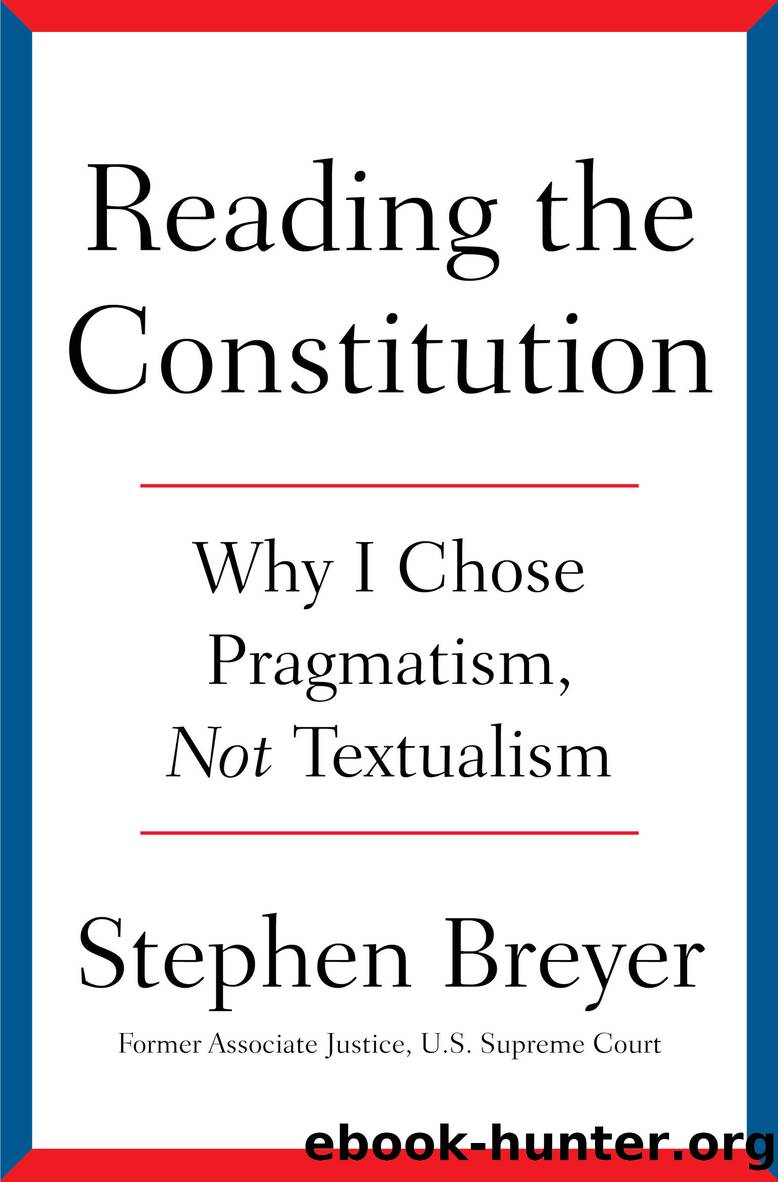Reading the Constitution by Stephen Breyer

Author:Stephen Breyer
Language: eng
Format: epub
Publisher: Simon & Schuster
Published: 2024-03-26T00:00:00+00:00
The Non-Delegation Theory
As I have noted, the courts have long held that the delegation of substantive rulemaking authority to executive agencies must be guided by an âintelligible principleâ standard. That is, Congress may delegate regulatory authority to the executive branch so long as it supplies an âintelligible principleâ to guide the executiveâs use of regulatory discretion.30 So long as Congress does so, there is no serious risk that the executive branch will abrogate the authority of the legislative branch.31
Traditionally, then, the Supreme Court has not insisted upon an âintelligible principleâ standard that is definite or strict. In Cargo of the Brig Aurora,32 for example, the Supreme Court saw âno sufficient reasonâ to declare unconstitutional Congressâs delegation of authority to the president to end trade embargoes against Great Britain and France after determining that they had âceased to violate the neutral commerce of the United States.â33 And in J.W. Hampton, Jr., & Co. v. United States,34 the Supreme Court upheld a statute giving the president the power to impose tariffs that would âequalize the differences in costs of productionâ between the United States and other countries.35 These broad terms gave much leeway to the executive branch in the exercise of rulemaking authority yet still provided enough of an intelligible principle to avoid any constitutional issues.
But in 1935, in A.L.A. Schechter Poultry Corp. v. United States,36 the Supreme Court held that Congress had gone too far in its delegation. The statute created commissions for major industries. The members of those commissions consisted in large part of persons who worked in those industries, as executives, workers, or other private citizens. And it was the job of those commissions to write legally binding codes of âfair competition.â37 What is that? Both Chief Justice Charles Evans Hughes and Justice Cardozo explained why âfairâ competition was not the opposite of âunfair competition.â They argued that there is no way to give that phrase any definite meaning.38 Put that fact together with the fact that, not government, but private individuals in an industry will set their own code, and we have what Justice Cardozo called âdelegation running riot.â39 The Court struck the statute down.40 But the Court quickly abandoned Schechterâs fairly strict non-delegation rule, returning to a looser and more workable version of the intelligible standard.41 Indeed, aside from Schechter and one other case in 1935,42 the Court has never found a delegation to an agency of rulemaking power to have gone too far.43
Recently some judges have urged the courts to return to the non-delegation theory of Schechterâthis time giving it teeth.44 Such an approach might, for instance, require Congress to delegate with such specificity that an agency need only âfill up the details,â45 or allow Congress to make application of a law âdependent on executive fact-finding,â46 or assign ânon-legislativeâ47 responsibilities to other branches. In a recent case, the Fifth Circuit embraced this sort of robust non-delegation theory.48 But there are multiple problems with such an approach. One is historicalâwhile enthusiasts of a robust non-delegation theory such
Download
This site does not store any files on its server. We only index and link to content provided by other sites. Please contact the content providers to delete copyright contents if any and email us, we'll remove relevant links or contents immediately.
The Secret History by Donna Tartt(16670)
The Social Justice Warrior Handbook by Lisa De Pasquale(11495)
Thirteen Reasons Why by Jay Asher(7805)
This Is How You Lose Her by Junot Diaz(5801)
Weapons of Math Destruction by Cathy O'Neil(5050)
Zero to One by Peter Thiel(4838)
The Myth of the Strong Leader by Archie Brown(4796)
Promise Me, Dad by Joe Biden(4459)
Beartown by Fredrik Backman(4437)
Stone's Rules by Roger Stone(4424)
How Democracies Die by Steven Levitsky & Daniel Ziblatt(4421)
The Fire Next Time by James Baldwin(4352)
100 Deadly Skills by Clint Emerson(4089)
A Higher Loyalty: Truth, Lies, and Leadership by James Comey(4043)
Rise and Kill First by Ronen Bergman(4026)
The David Icke Guide to the Global Conspiracy (and how to end it) by David Icke(3897)
The Farm by Tom Rob Smith(3880)
Secrecy World by Jake Bernstein(3791)
The Doomsday Machine by Daniel Ellsberg(3741)
